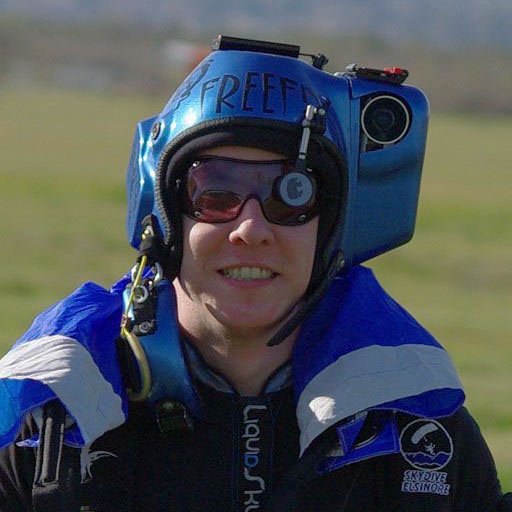Recommended Posts
gerrcoin 0
I do, but I'm still on low #'s and there's the time requirements for the ratings and certs.
However, I was talking to one of the skygods on the DZ the other weekend who has 5000+ jumps. He dowsn't know how many for sure because he doesn't even log them anymore. He was telling me that he used to have a hell of a time jumping at other DZ's because they normally like to look over your logbook before letting you jump if they don't know you. He had to look around for someone who knew him and go with them to the manifest before he could jump.
However, I was talking to one of the skygods on the DZ the other weekend who has 5000+ jumps. He dowsn't know how many for sure because he doesn't even log them anymore. He was telling me that he used to have a hell of a time jumping at other DZ's because they normally like to look over your logbook before letting you jump if they don't know you. He had to look around for someone who knew him and go with them to the manifest before he could jump.
champu 1
QuoteIt is so hard to "guess" the duration of your freefall, especially with freeflying and all the different speeds we are able to go. Also opening altitudes are different on every jump I do, for example doing formations I'll be open at 3000 ft - 2500 ft and doing camera work open at 4000 ft - 3500 ft.
I actually count the time out during every freefall, sure I have a protrack, but those can be off but as much as two seconds can you believe that?
I've always been a numbers freak, and so I've always kept my logbooks as up to date as possible. I'm certain that my freefall time is most definitly an estimation as my first 2500 jumps or so were done without the benefit of such things as pro-dytters and video. Today, though, the vast majority of my jumps are recorded by one or the other, so the time is much more accurate. Even so, I'll bet that I'm not more than an hour out one way or another.
To deal with such things as the always-problematic keeping the signatures up to date, I have a personal tradition of taking the logbook to the restaurant on Saturday and Sunday evenings and running it around the table for everyone to sign. Do I really need licensed jumpers to sign each one? Nah. At this point it's also a diary of people I've met and had fun with on this journey. It's really cool to go back 15 - 20 years and read the signatures (that are readable), and remember some great times and jumps I've had with that person.
I intend to keep logging until my ash dive. Which, I suppose will have to be filled out by someone else.
Good logging also helps me to remember really cool dives that I otherwise would forget. If you do this for 30 - 40 years and thousands of jumps, you're not going to remember them all.
Lots of jumpers say they stop at some point because it's too much trouble. But after a few years, those same jumpers then regret not having logged. Don't be one of them.
Besides, as you go through your career, you're joining an even more exclusive club. Not many people on this earth do what we do. Even fewer make it to 10,000 jumps and 170 hours of freefall. This does not mean you're the best skydiver on the planet, but it does mean you've achieved something significant, if only to yourself. But you'll never know what you achieve if you don't keep a record of it.
To deal with such things as the always-problematic keeping the signatures up to date, I have a personal tradition of taking the logbook to the restaurant on Saturday and Sunday evenings and running it around the table for everyone to sign. Do I really need licensed jumpers to sign each one? Nah. At this point it's also a diary of people I've met and had fun with on this journey. It's really cool to go back 15 - 20 years and read the signatures (that are readable), and remember some great times and jumps I've had with that person.
I intend to keep logging until my ash dive. Which, I suppose will have to be filled out by someone else.
Good logging also helps me to remember really cool dives that I otherwise would forget. If you do this for 30 - 40 years and thousands of jumps, you're not going to remember them all.
Lots of jumpers say they stop at some point because it's too much trouble. But after a few years, those same jumpers then regret not having logged. Don't be one of them.
Besides, as you go through your career, you're joining an even more exclusive club. Not many people on this earth do what we do. Even fewer make it to 10,000 jumps and 170 hours of freefall. This does not mean you're the best skydiver on the planet, but it does mean you've achieved something significant, if only to yourself. But you'll never know what you achieve if you don't keep a record of it.
Mike Ashley
D-18460
Canadian A-666
D-18460
Canadian A-666
damion75 0
QuoteI use a Protrack to log my freefall time, so its kept up to date in my logbook pretty regularly. One good reason to log it is that freefall time is a pre-requisite for some ratings.QuoteHow many people out there still work out their total freefall time.
Same detail - you need the times later... and filling in details from hundreds of jumps ago is a PITA!!
***************
Not one shred of evidence supports the theory that life is serious - look at the platypus.
Not one shred of evidence supports the theory that life is serious - look at the platypus.
bch7773 0
if i ever need to add up my freefall time for a rating, ill just go back into my logbook and figure it out. sure it will take an hour or two, but its better then spending a few minutes after every jump calculating it and writing it down.
plus with freefall time, you can usually guestamate it and be close enough. its not like you have to be accurate to the second.
MB 3528, RB 1182
plus with freefall time, you can usually guestamate it and be close enough. its not like you have to be accurate to the second.
MB 3528, RB 1182
teason 0
Me Me I do!
And I'm acurate to with 2 or 3 hours!
So far I have ... um ... carry the 2 ...
10 hrs, 97 min and 487 seconds!

And I'm acurate to with 2 or 3 hours!
So far I have ... um ... carry the 2 ...
10 hrs, 97 min and 487 seconds!
I would rather be a superb meteor, every atom of me in magnificent glow, than a sleepy and permanent planet.
Bosveld 0
QuoteFor our AFF and Tandem ratings, ther is a minimum freefall time requirement, 3 hours, I think, as well as a 500 jump minimum.
In SA I know Tandem and AFF ratings require 1000 jumps, but I don't know anything about free fall time. Maybe someone from SA can clear that up for me?
Whatever the mind can conceive and believe, will be true!
JohnMitchell 14
Looks like AggieDave has the right numbers, 6 hours of freefall, not 3. It's been so many years that I've forgotten a lot of the numbers, need to start looking stuff up again. 
Tonto 1
Quote
In SA I know Tandem and AFF ratings require 1000 jumps, but I don't know anything about free fall time. Maybe someone from SA can clear that up for me?
You need 10 hours of documented freefall time for entry to the PASA AFFIC course and I think the Tandem rating is 800 jumps and 10 hours too. Just because you're in South Africa doesn't mean you can't apply for Gold freefall certificates, etc from the USPA. Just takes a year of membership and if you've done the logging - you can get the awards.
I recently did my 50th hour of freefall. Not much for 4000+ dives, but the lower exit altitudes we get, and 700+ Canopy Formation dives will do that to you.
t
It's the year of the Pig.





Share this post
Link to post
Share on other sites